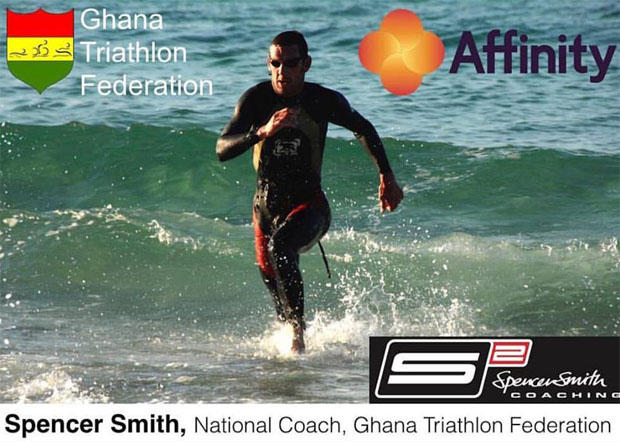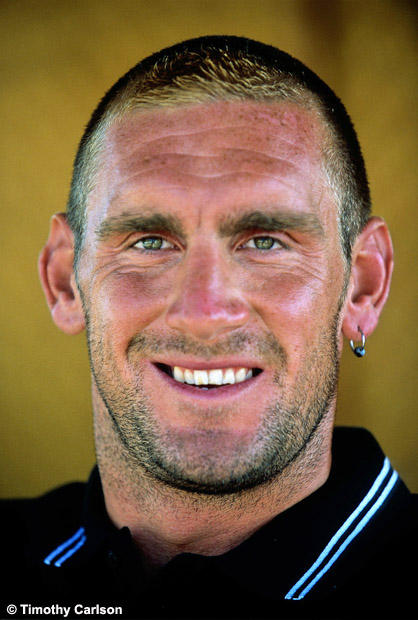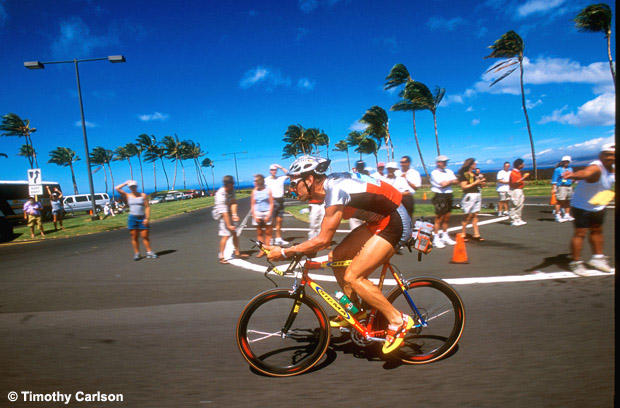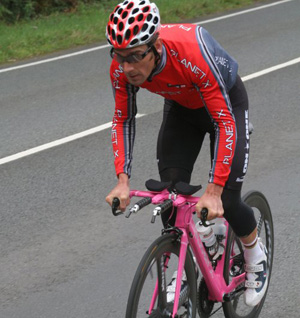Spencer Smith to coach Ghana
Spencer Smith, a retired 3-time ITU Olympic distance World Champion and 2-time Ironman winner, has been hired by the Ghana Triathlon Federation to lead its fledgling national program.
Smith, who has been running his S2 Coaching business training multisport athletes, is traveling to Ghana this week to host a series of swim and run training sessions culminating in a sprint triathlon on May 29 in Accra, Ghana.

Smith was hired by Tarek Mouganie, the CEO of the Ghana Triathlon Federation and a Ghanaian national athlete who tasked Smith with the immediate goal of growing the sport in Ghana from the ground up and a long term goal of finding and nurturing international class triathletes.
Smith faces a long road in building Ghana triathlon from scratch, but is no stranger to perseverance. He was judged innocent in all three hearings seeking to suspend him from competition for what was determined to be a false positive for a performance enhancing drug tested after the 1998 Ironman World Championship.
Smith won the 1992 ITU Junior World Championship and the 1993 and 1994 ITU World Championship. He finished 5th in 1998 and 8th in 2000 at Kona.
Slowtwitch: Spencer what led you to Ghana?
Spencer Smith: It came about from one of my athletes that I coached. He was thinking of perhaps preparing for another Ironman but I persuaded him to perhaps have a go at the shorter distance racing within the ITU circuit.
ST: How did the Ghanaian Triathlon Federation get in touch with you?
Spencer: The Federation is newly formed in the last 3 years. We decided that for us to really make a splash in Ghana and the rest of the world it would be imperative to form a Federation.
ST: Have you spoken with other coaches who have served as Head Triathlon Coaches of other countries such as Libby Burrell, Cliff English and many more?
Spencer: I have a good friend, Michael Gilliam chief advisor to the Bahrain Olympic committee (amongst a whole host of other duties), who has been advising me, along with giving me valuable ways to navigate and work and coach with the Federation.
ST: While you live in the U.S., how will you serve Ghana Triathlon? Where it is based? What sort of facilities?
Spencer: It will be mostly done via the Internet to start, but hopefully there will be many trips to Ghana where I will be able to get stuck in. I definitely want to be part of a hands on approach. Coaching is all about communication, so the need to be present is vital. The Federation is based in the capital Accra (ghanatriathlon.org). When I visit there in the next week or so I will have better understanding of the facilities available to us. There are pools and a running track available at certain times; the riding is going to be a little trickier. I do believe there is always a way to get the job done if you really want it to happen.

ST: What is the biggest challenge in this job?
Spencer: Right now one of our biggest hurdles is funding. We need equipment and we need readily available access to the facilities. Once we have these two issues in place we can really start to get the ball rolling. My goal is to push and have some sponsors in place to help us move forward asap.
ST: What are the top Ghanaian triathletes and what have been their results?
Spencer: Tarek Mouganie (www.mouganie.com ) is currently Ghana’s top triathlete. The results as we speak are modest in terms of top end results (World titles etc), but that is the exciting and motivating part of getting involved at this level. We can create and mold something that can hopefully lead to a major placing one day on the podium.
ST: What do you see as the potential in Ghana?
Spencer: Mighty oaks from little acorns grow. I think sums up the potential here beautifully. Yes, it is going to take time and a lot of effort but nothing comes from not rolling up our sleeves and diving in. I think it is important to take small steps but with keeping an eye on the big picture, which is placing on the podium at major championships.
ST: Why does Ghana want a top triathlon program?
Spencer: The mandate is to develop platforms of sports health and wellness for the sons and daughters of Ghana. I think it is important to give hope to the youth. With this being an Olympic year, there is no better time for a country to spread the message of sport and health and its benefits to the community.
ST: Tell us about your experience with your S2 coaching company? What lessons from your coaching will play a role in your Ghana program?
Spencer: The biggest lesson I have learned is patience. The beauty of my job is dealing with many different athletes from around the world, and being a coach as opposed to an athlete, you need to communicate your point well in the hope that we all come together and make the goal, whatever it may be, become a reality.
ST: Who were your coaches? I know your late dad played a big part in the early days. What were their roles in your career?
Spencer: My biggest mentor and coach was Bill Black. He taught me so, so much. He truly is a beautiful guy, and I have so much love and respect for him. As I moved up to Ironman distance Paul Huddle then took over the reins. I was so fortunate throughout my career to have not only coaches but also people who cared deeply for me as a friend. My dad played every role. He had so much passion and enthusiasm. He drove everything forward even when the going got tough.
ST: Will your program focus on Olympic and sprint distance?
Spencer: I think for now we want to get as many people interested in the sport as possible. Sprint and Olympic distance is a perfect place to start as it is perhaps less daunting and requires less training time. But in the end whatever the distance, the goal is simple: Get participation up and for the people to fall in love with our beautiful sport.

ST: Have you been to Ghana?
Spencer: I have not visited Ghana yet. I am leaving this week. I am very excited about the prospect of not only exploring a new part of the world but also having a purpose whilst doing it.
ST: What do you think about the global rise of triathlon?
Spencer: The sport has come such a long way over the last 20 years, but I do believe we have much more to do. This to me was a perfect example of the fact that, yes we are on the world stage now, but the stage can and should keep growing. What better way to introduce people (and athletes) to new cultures, through sport.
ST: What strengths you will bring to this endeavor?
Spencer: I believe experience and also passion. I have been in the sport for 27 years now and it has really help shape the person I am today. When you are an athlete and then a coach you learn to love the success and live with and learn from disappoints. Throughout my career I have dealt with all of that and then some.
ST: After such a great career, what were your feelings about retirement? Any regrets? What are you most proud of?
Spencer: Hindsight is a beautiful thing but the one thing I wanted to do when I retired was continue to love the sport. I have done that. I am not bitter about what I didn’t accomplish but certainly I am disappointed that I did not perform to my potential in Hawaii.
ST: What might your dad say about this assignment?
Spencer: My dad was always so very proud of the way I performed, win or lose. If he were here today alongside me he would be driving the bus for sure. He was a huge character and hopefully some of that has rubbed off on me.
ST: Ghana has had four Olympic medalists – three in Boxing and one in football. Geographically it is on the equator in West Africa, which generally speaking harbors a population of highly-muscled, fast-twitch sprinters rather than the slender endurance kings of East Africa in Ethiopia and Kenya. What might be your recruiting pitch to a population that is mad about boxing and soccer?
Spencer: Gaining awareness is key. I am holding a number of free clinics whilst I am over there, culminating in a race at the end of the week. If I can walk away with just one person falling in love with this sport, I have achieved something. Yes, it is true the country is mad for both boxing and soccer BUT coming from England, a country mad for football, we were still able to produce World and Olympic Champions. Why not Ghana in the future?
ST: How might you go about finding funding for the bikes, swimsuits., running shoes and perhaps heart rate monitors and gym equipment for your elite teams?
Spencer: We are going to need help from the private sector, as money at the moment is very limited. We will indeed be asking companies for the basics (equipment etc) due to the fact that as of right now we have very little. We would appreciate any help that is available.
ST: Would you be keen on using modern digital power and heart rate monitors? Or would you rely on old school perceived exertion and feel?
Spencer: I think you have to look at the current situation, and our number 1 goal right now is to get participation and awareness up. Once people start to understand the sport at a basic level and hopefully see and feel the benefits it has to offer we then start to get more technical. Let’s start at a grass roots level and build from there.


